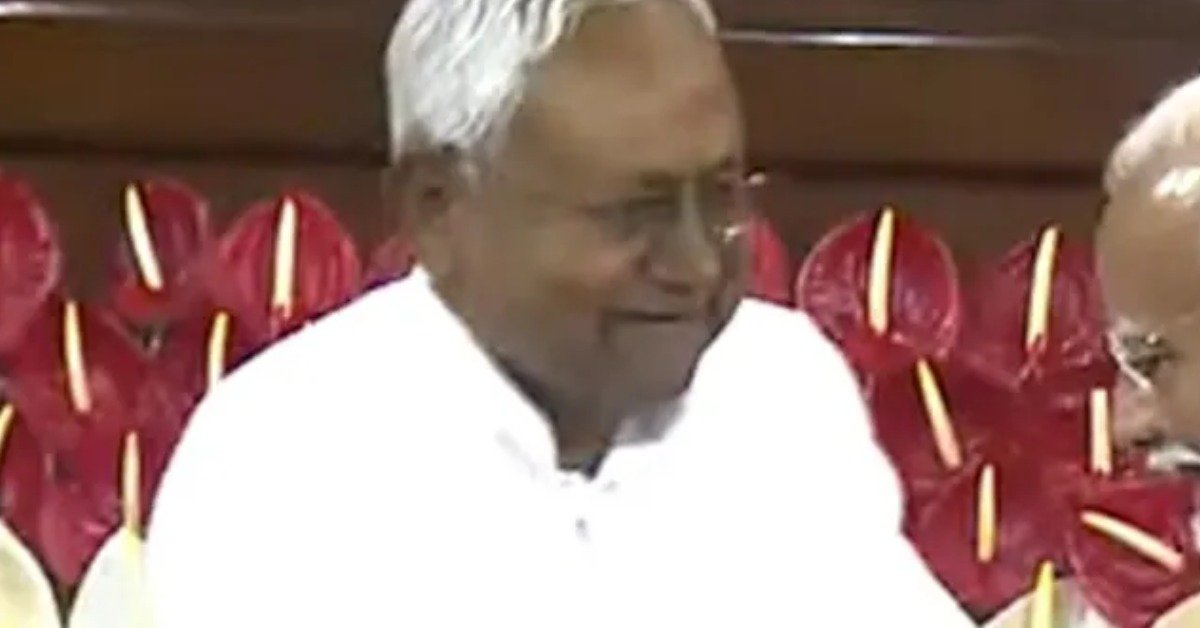
Summary: New Delhi – Bihar Chief Minister Nitish Kumar has confirmed his support for Prime Minister Narendra Modi’s third term, solidifying his allegiance to the BJP-led National Democratic Alliance (NDA). This endorsement follows Kumar’s switch from the Congress-led INDIA opposition bloc, which he helped establish.At a meeting of the NDA’s newly-elected MPs, Kumar took a jab at his former allies, stating, “I will be with PM at all times” and criticizing the INDIA bloc for lacking achievements. His backing comes as the BJP, having won 240 seats, falls short of the 272-seat majority needed in the Lok Sabha. Kumar’s JDU, with 12 MPs, and Chandrababu Naidu’s TDP, with 16 MPs, are crucial for the NDA’s efforts to secure a stable government.Despite speculation about a possible return to the INDIA bloc, Kumar remains committed to the NDA, demanding ministerial positions and specific roles for his party in return for his support. His demands include two cabinet posts, a junior Union Minister berth, and a common minimum programme, with a particular interest in the Railways Minister position.Kumar’s exit from the INDIA bloc was influenced by internal disputes, notably delays in his appointment as the Convenor, driven by Rahul Gandhi’s intervention. As political dynamics shift, Kumar’s strategic moves highlight his significant influence in the current political landscape.
New Delhi – Bihar Chief Minister Nitish Kumar has once again stirred the political landscape by formally endorsing Prime Minister Narendra Modi for a third term, while taking a swipe at his former allies in the Congress-led INDIA bloc. His declaration came during a meeting of the BJP-led National Democratic Alliance’s (NDA) newly-elected Members of Parliament on Friday, amidst ongoing political realignments following the Lok Sabha elections.
In a decisive move, Kumar, the leader of the Janata Dal (United) [JDU], distanced himself from the opposition alliance he helped to form and which secured a significant 232 seats. The BJP, despite being the largest party, fell short of a clear majority, securing only 240 seats, well below the 272 required to form the government independently.
Kumar, known for his political shifts, emphasized his loyalty to Prime Minister Modi. “I will be with PM at all times,” he asserted, responding to critics who anticipated yet another shift in his alliances. This statement was a rebuttal to speculation about a possible return to the INDIA bloc, which had shown interest in rekindling their association with Kumar to strengthen their position against the BJP.
A Critical Role for Nitish Kumar
With the BJP needing support to bridge the gap to a majority, Kumar’s 12 JDU MPs, along with 16 MPs from Chandrababu Naidu’s Telugu Desam Party (TDP), have become pivotal for the NDA’s ability to form a stable government. The rest of the NDA, comprising 25 seats, is insufficient on its own to secure the majority threshold, placing significant importance on Kumar’s backing.
Speculations and Strategic Demands
Amid the political maneuvering, there were rumors of a possible reconciliation between Nitish Kumar and the INDIA bloc. Senior INDIA figures, including former Maharashtra Chief Minister Uddhav Thackeray, hinted at extending an olive branch to Kumar, acknowledging his crucial role in the alliance’s initial formation. However, Kumar remained non-committal, fueling further speculation as he attended the NDA parliamentary meeting in Delhi alongside Chandrababu Naidu.
Sources close to Kumar clarified that a reunion with the INDIA bloc was unlikely. Instead, the JDU has laid out specific demands to the BJP in exchange for their continued support. These include two cabinet positions, a junior Union Minister berth, and a common minimum programme. The JDU is particularly interested in the Railways Minister post, which Nitish Kumar previously held.
Frustrations with the INDIA Bloc
Kumar’s decision to leave the INDIA bloc reportedly stemmed from frustrations over delays and internal disagreements regarding his potential appointment as the Convenor. A key incident involved Rahul Gandhi, who suggested deferring Kumar’s appointment due to the absence of Trinamool Congress leader Mamata Banerjee from a crucial meeting. This intervention led to dissatisfaction within the JDU and contributed to Kumar’s eventual exit from the alliance.
Statements from Allies
Bihar’s Deputy Chief Minister Vijay Kumar Sinha affirmed Kumar’s commitment to the NDA, stating, “Nitish was, is, and will remain part of the NDA.” Despite maintaining a public silence on the issue, Kumar’s actions and strategic demands indicate a clear alignment with the NDA, reflecting his pragmatic approach to coalition politics.
As the NDA navigates the post-election landscape, Nitish Kumar’s role and demands will significantly influence the coalition’s strategy and stability. His endorsement of Prime Minister Modi, coupled with his critical stance towards the INDIA bloc, underscores his decisive position in the evolving political scenario.
Last Updated on: Saturday, June 8, 2024 6:04 pm by News Week India Team | Published by: News Week India Team on Saturday, June 8, 2024 6:04 pm | News Categories: General, India, Latest, News, Politics

Leave a Reply